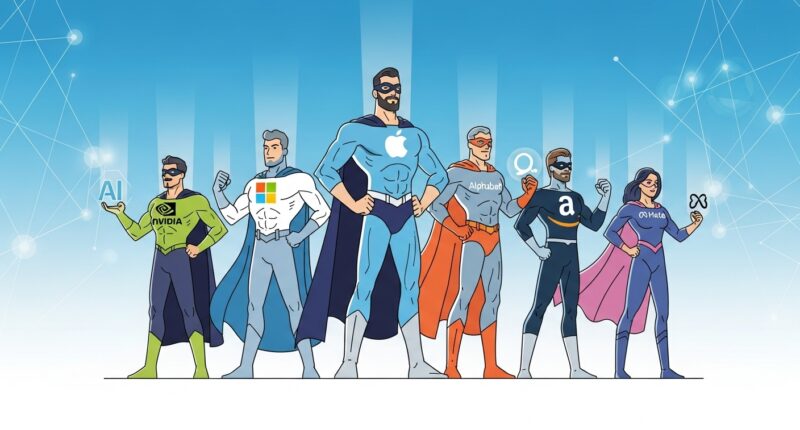The six largest technology companies in the world are now responsible for nearly half of the Nasdaq Composite’s entire market value, having added $4.9 trillion in market capitalisation over the past year alone, according to a major new report by venture capital firm Accel.
The 2025 Globalscape report reveals that the “Super Six” — Nvidia, Microsoft, Apple, Alphabet, Amazon, and Meta — now boast a combined market cap of $20.7 trillion. Nvidia leads the pack, having become the world’s first $5 trillion company, while the group as a whole accounted for approximately 50 per cent of the Nasdaq’s total value in October 2025.
This concentration of power at the top is mirrored by an explosion in venture capital funding, which is expected to reach a record $184 billion across the US, Europe, and Israel in 2025, representing an 84 per cent year-on-year increase.
The report highlights a distinct geographical divide in how this capital is being deployed. US companies are dominating the capital-intensive race to build foundational AI models, securing $106 billion in funding compared to just $4 billion for their counterparts in Europe and Israel.
However, the application layer tells a different story. The report notes a “levelling of the AI playing field” in software and applications, where European and Israeli start-ups secured $30 billion in funding — nearly two-thirds of the $45 billion raised by US companies in the same sector.
The driving force behind this growth is a “tectonic shift” in infrastructure spending. Accel estimates that the global build-out of AI data centres will require a staggering $4 trillion investment over the next five years.
A new industrial revolution
“We are at the beginning of a new industrial revolution… over the course of the next four or five years we’ll have $2 trillion worth of data centres that will be powering software around the world,” said Jensen Huang, CEO of Nvidia, in the report.
This infrastructure expansion is both physical and financial. The report projects that global data centre capacity will need to grow by 117 gigawatts by 2030 to meet the demand for AI compute. To put this in perspective, that additional capacity is enough to power Italy, Spain, and the UK combined.
“We are witnessing a tectonic shift, with AI accelerating innovation across the globe and unprecedented growth in AI native applications and enterprise agentic workflows,” said Philippe Botteri, partner at Accel. “This shift will require an estimated $4 trillion investment in computing data centres over the next five years.”
Despite growing fears among some investors of an AI asset bubble, the report argues that the fundamentals remain strong. It notes that the massive capital expenditure required is well within the means of the “hyperscalers” (companies like Microsoft, Amazon, and Google). Their combined operating cash flows are projected to reach $5.5 trillion over the same period, comfortably covering the estimated $4 trillion build-out costs.
Accel argues that the return on investment does not require a miraculous economic transformation. The report calculates that the massive spend would be justified if AI technologies drive a modest 1-2 per cent increase in global GDP growth annually between 2026 and 2030.











